
3 min read
Social Equity Programs and Cannabis
Social equity programs have been one of the biggest talking points of cannabis regulation, but the exact application and definition changes from state to state. On this very blog, issues with California’s system have been made clear but they’re just one of the worse examples. Many states have approached this differently, and Illinois is one of the states that’s done an enviable job.
Why Social Equity At All?
Cannabis has a very unique place in the current economic market, and because of that it takes special employees. A level of stigma continues to surround cannabis, and while it lessens every day, it still makes for roadblocks. Few people who aren’t at least mild cannabis enthusiasts will be interested in getting a job working with it each day, and frankly that’s a good thing. As more people are introduced to cannabis, there needs to be more experts and those are the people that need to be staffing dispensaries and retail locations.
One of the obvious hangups here is the issue of enthusiasts also being the most likely to have been involved in legal complications due to prohibition. Even now, only half of Americans have access to any form of legal cannabis, and it’s an even smaller percentage which have access to fully recreational cannabis. Thinking about it this way and seeing “sanctioned” cannabis use as a percentage of a percentage drives home the idea that the people selling it need to also be the people using it. Mind-altering substances should be handled and doled out by those with experience and knowledge, and the long-standing stigma around cannabis makes that more difficult than other industries.
The Hangups
This push for “expert employees,” so-to-speak has created some issues in and of itself. Many states include tests, licenses, and fees that are required for someone to work in a dispensary. This means people that have criminal records from cannabis convictions who are already struggling are having an undue burden placed on them. That being said, it’s a necessary burden to avoid getting budtenders and retail owners who aren’t as knowledgeable as their customers need them to be.
The Reality and The Intent
Social equity programs have been created to circumvent all these issues. Lower the barrier for entry, get the people with the expert knowledge into places it can be useful, and stimulate the economy from both sides of the retail cannabis industry. States like California prioritize issuing licenses for those that live in low-income areas as well as people who have had prior criminal convictions relating to cannabis. The reality is much more complicated, and many have expressed dissatisfaction with the state’s rollout as many citizens slip through the cracks or just barely avoid qualifying for various reasons. COVID-19 has supercharged these issues as employment has become more important and more scarce, and cannabis use has risen in virtually every legal market. In the case of Illinois for example, they’ve been attempting to make their system more inclusive of those that need it, but COVID has gotten in the way of those attempts even as they become more critical.

